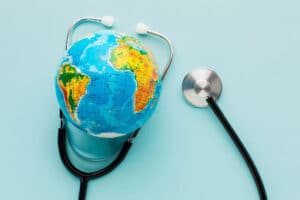Global Health Initiatives: Changemakers Battling Diseases Worldwide
In this diverse population, global well-being plays a vital role, and that’s why public health initiatives are as important.
As the world deals with health challenges, its time that changemakers make an impact by helping people at scale.
Every changemaker has the power to transform global health and foster positive change.
Changemakers guide people so that they can reshape the future through collective efforts of health initiatives.

The Landscape of Global Health
In the current situation of global health, we face different kinds of challenges that need our attention.
These infectious diseases underscore the nature of the global health landscape.
Conditions such as malaria, HIV/AIDS, and other diseases posed by emerging viruses are threats to human well-being.
Non-communicable diseases like cardiovascular conditions and diabetes also continue to take a heavy toll.
Key challenges include:
- Unequal access to healthcare.
- Need for more resources in marginalized regions.
- The ongoing battle against antimicrobial resistance.
The intersection of health with social, economic, and environmental factors amplifies these challenges.
As we see the landscape, there is an urgent need for these health initiatives.
Now, it is time to focus on health equity and innovative solutions to tackle health challenges.
Notable Global Health Initiatives
Here are some global health initiatives:
- Global health security:
Prepares for and responds to public health threats and reduces or prevents their spread across borders. - The Global Fund:
One of the biggest funders of the UN health-related Sustainable Development Goal (SDG3). - Maternal and child health:
Maternal and newborn health issues are a global health priority. - Family planning:
The availability of family planning services allows one to achieve the desired birth spacing and family size. It contributes to improved health outcomes for infants, children, women, and families. - World Health Organization:
Established in 1948, it brings together more than 150 countries to address global health challenges. - Global mental health:
Seeks to address one of the most neglected global health issues of our time.

Innovations in Disease Prevention
Disease prevention can be achieved by eliminating the causes of a disease or by increasing resistance to it.
Some innovations in disease prevention include:
- CRISPR and malaria:
Gene-editing technologies like CRISPR can reduce disease levels by genetically modifying malaria-carrying mosquitos. - Penicillin:
Alexander Fleming’s discovery of penicillin in 1928 led to the development of modern antibiotics. - Digital imaging and artificial intelligence:
These technologies can lead to earlier diagnoses, which can lead to less invasive and more effective treatments. - Virtual reality:
Virtual reality can speed up healing in rehab. - Artificial intelligence:
Artificial intelligence can be better than medical experts at spotting lung tumours.
Other technologies that have a positive impact on the healthcare industry include Machine learning, Augmented reality, and Wearable technology.

Addressing Epidemics and Pandemics
Global health initiatives play a critical role in responding to epidemics and pandemics,It employs comprehensive strategies to mitigate the impact of infectious diseases.
A notable recent example is the global response to the COVID-19 pandemic.
Organizations such as the World Health Organization (WHO) took a lead role in coordinating international efforts, providing guidance, and facilitating the equitable distribution of vaccines.
The Coalition for Epidemic Preparedness Innovations (CEPI) emerged as a vital player in the pandemic response. It focuses on accelerating the development of vaccines against emerging infectious diseases.
Collaborative efforts involving governments, NGOs, and pharmaceutical companies facilitated the rapid development, testing, and distribution of COVID-19 vaccines, showcasing the power ofglobal cooperation.
The Access to COVID-19 Tools is a framework involving multiple global health organizations.
The aim is to ensure equitable access to diagnostics, treatments, and vaccines. This initiative exemplified a coordinated response to address the multifaceted challenges posed by the pandemic.
These examples highlight the importance of a unified global health response during health crises.
With expertise, resources, and rapid information sharing, health initiatives play a significant role.
They contribute to crisis management, underscoring the need for ongoing collaboration to address current health challenges.

Changemakers in Action
In the realm of global health, numerous changemakers have dedicated their efforts to making a lasting impact on disease prevention and management.
The Bill and Melinda Gates Foundation stands out as a transformative force, contributing substantial resources and expertise to combat infectious diseases like malaria, HIV/AIDS, and polio.
Through strategic partnerships and innovative initiatives, the foundation has played a pivotal role in advancing global health outcomes.
Dr. Paul Farmer, co-founder of Partners In Health (PIH), exemplifies an individual changemaker whose work has significantly influenced global health. PIH focuses on providing healthcare to impoverished communities, emphasizing comprehensive and community-driven approaches to disease eradication.
Dr. Farmer’s dedication to addressing health disparities and building sustainable healthcare systems has left an indelible mark on the field.
These changemakers showcase the power of visionary individuals and organizations in driving positive change.
Their success stories underscore the transformative potential of concerted efforts in global health, inspiring others to join the collective journey toward a healthier and more equitable world.
Global Collaborations for Health
International collaborations and partnerships in the health sector are vital for addressing shared challenges and advancing global well-being.
Initiatives like the World Health Organization (WHO) foster cooperation between countries, pooling resources and sharing expertise to combat diseases on a worldwide scale.
Collaborative efforts include:
- Joint research.
- Coordinated responses to health emergencies.
- The establishment of frameworks for equitable vaccine distribution.
These partnerships exemplify the interconnectedness of global health, emphasizing the need for collective action to overcome health disparities and ensure access to quality healthcare for all.

Challenges in Global Health Initiatives
Global health initiatives face multifaceted challenges in their pursuit of widespread well-being.
Overcoming socio-economic disparities, ensuring access to healthcare, and navigating diverse cultures.
Coordination among nations with varying healthcare infrastructures and policy landscapes adds complexity.
The threat of emerging infectious diseases and evolving health crises test global health efforts.
Addressing these challenges requires innovative solutions, sustained funding, and a commitment to inclusive, adaptive strategies. That accounts for the diverse needs of populations worldwide.
Future of Global Health
The future of global health initiatives holds promise as technological advancements, data-driven strategies, and international collaboration pave the way for transformative changes.
Predictions include:
- A heightened focus on preventive measures.
- Leveraging artificial intelligence for healthcare solutions.
- Strengthening health systems’ resilience.
Emerging trends may emphasize community-based approaches, with a growing emphasis on mental health.
As technology continues to evolve, telemedicine and digital health interventions are likely to play pivotal roles, ensuring more inclusive and accessible healthcare solutions.
The combination of innovation and global cooperation sets the stage for a future where health initiatives can address emerging challenges.

The Final Say
In conclusion, global health initiatives are the ongoing battle against diseases, providing hope for a healthier world.
As changemakers and organizations work tirelessly, their impact resonates far beyond borders. Individuals must support these initiatives actively, whether through advocacy, donations or staying informed.
By standing united, we contribute to a collective effort that transcends geographical boundaries, striving for a future where health disparities are minimized, and communities worldwide thrive.
Together, we can be catalysts for lasting change and progress in the global health landscape. Stay informed, stay involved, and let health be a shared pursuit for all.
Ready to make a positive impact in the world?
UPDEED is the place for you. Our free and open platform is filled with inspiring stories from individuals and organizations who are making a difference in their communities and beyond. Connect and collaborate with like-minded individuals from around the globe on UPDEED, and discover your own potential to create meaningful change. Join our community and make a difference.





